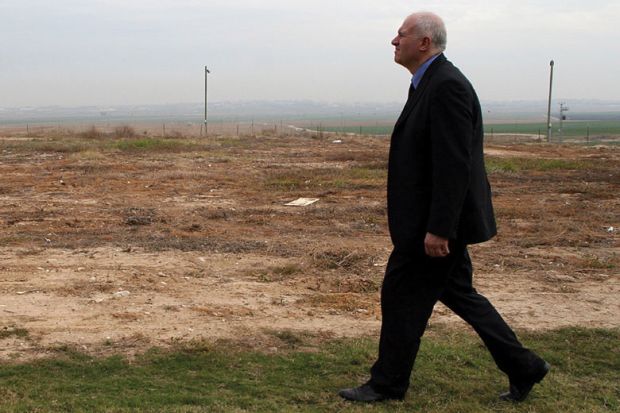After holding a series of ministerial posts in the Westminster government and a seven-year spell as vice-chancellor of the University of Bedfordshire, Bill Rammell could be forgiven for wanting to put his feet up.
But on a Wednesday evening in mid-January, Mr Rammell was instead waiting out a rainstorm on an empty campus in Erbil, the capital of Iraq’s autonomous Kurdish region.
The weather had soured since his arrival last August, winter floods replacing the scorching summer days.
“It’s one of the challenges of being here,” he said, laughing. But he does not appear to mind: a taste for challenges is what drew him here.
When Mr Rammell last visited Kurdistan, in 2008 as a Foreign Office minister, Erbil was a very different place. Since then, the city has undergone an “incredible” transformation, by his account.
In his new role as president of the University of Kurdistan Hewlêr (UKH), Mr Rammell has a front-row seat on the next years of its development.
When UKH approached Mr Rammell, the chance of working in a faraway place piqued his interest. It was also good timing: having left Bedfordshire at the end of 2019, he was just months into his work as a freelance consultant when the UK entered its first Covid-19 lockdown. After months of working from home, Kurdistan seemed a welcome opportunity.
“It made me feel I still had a big executive job in me,” he said of the position. “As a vice-chancellor, I’d worked on a number of international partnerships. But I’d never worked on the ground in an international institution…the more I looked at the university, the more I saw it as well as a management challenge I would relish.”
The location of his new gig – which may have raised some eyebrows among his less adventurous colleagues – was also a draw.
“The Kurds are something of a cause célèbre to my generation of political activists,” said Mr Rammell. “I’d been minister of state to the Middle East, so I knew…how much the Kurds had suffered in the past.”
Decades after a bloody civil war, the region is now “a beacon” for upholding religious tolerance and gender equality, resisting extremism and supporting economic diversification away from a reliance on oil revenues, “in all of which higher education is a key driver”, he said.
Although the recent history of violence had initially made him hesitate, he said, the university had been “very quick” to allay any security concerns. (At a recent graduation ceremony, he joked that he felt safer in Erbil than he did in some parts of London.)
For its part, the university wanted someone who understood Kurdistan’s particular challenges but who could bring an outsider’s perspective.
While Mr Rammell’s current job is very similar to that of an administrator in the UK, it has some particular novelties. Part of his task is to push back against “wasta” culture – an Arabic word meaning “nepotism”. Still an influence on hiring decisions in many Arab countries, it affects university admissions when parents try to secure their children’s admission through family influence.
“I’d been appointed to resist that 100 per cent,” said Mr Rammell. “Saying ‘No, you don’t meet entry requirements’ is easier for me than for someone from the country.”
Mr Rammell will be looking to ensure that the university is up to international standards of quality while reducing its reliance on indirect government subsidies, which currently make up 35 per cent of its operating costs. He is also shifting more funding towards specific research areas, including creating centres for artificial intelligence and healthcare innovation, regional and international research and sustainability to build on existing “pockets of excellence”.
Expanding and diversifying the student body is also high on his agenda. Since he joined, student numbers are up by 25 per cent, and more changes are on the way. Currently, UKH has a relatively small proportion of international students – made up largely of Syrian refugees and Jordanians. Mr Rammell wants to increase recruitment across the Middle East and beyond, from the US and the UK – although he recognised that, like him, Western students will need reassurance on safety.
He has already started to grow the university’s international ties. In December, UKH began a research partnership with the London School of Economics to study how youth activists and artists and women’s groups have influenced the development of Iraqi Kurdistan since the withdrawal of Islamic State. It is currently in discussions with two other UK-based institutions and with one in France.
Mr Rammell hoped all this work would make his university a centre of thought in the region and, more broadly, “put Kurdistan on the global map” of higher education.
“The development of democracy goes alongside the development of higher education,” Mr Rammell said. “I think I can contribute something to that.”
POSTSCRIPT:
Print headline: ‘Here I can contribute to HE – and democracy’
Register to continue
Why register?
- Registration is free and only takes a moment
- Once registered, you can read 3 articles a month
- Sign up for our newsletter
Subscribe
Or subscribe for unlimited access to:
- Unlimited access to news, views, insights & reviews
- Digital editions
- Digital access to THE’s university and college rankings analysis
Already registered or a current subscriber? Login








